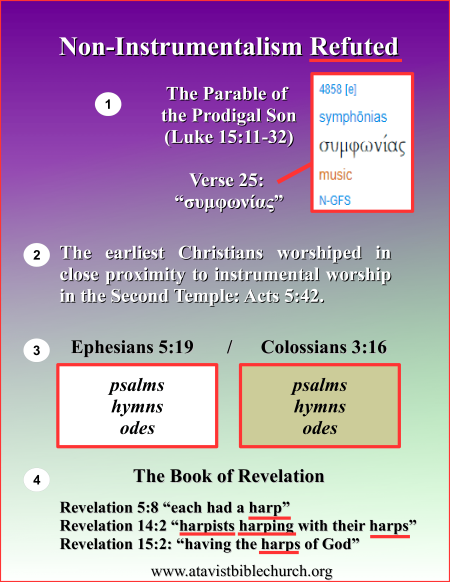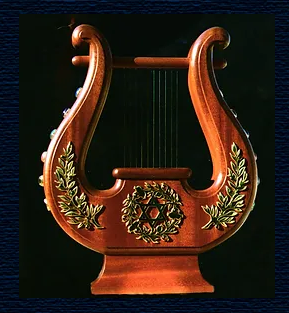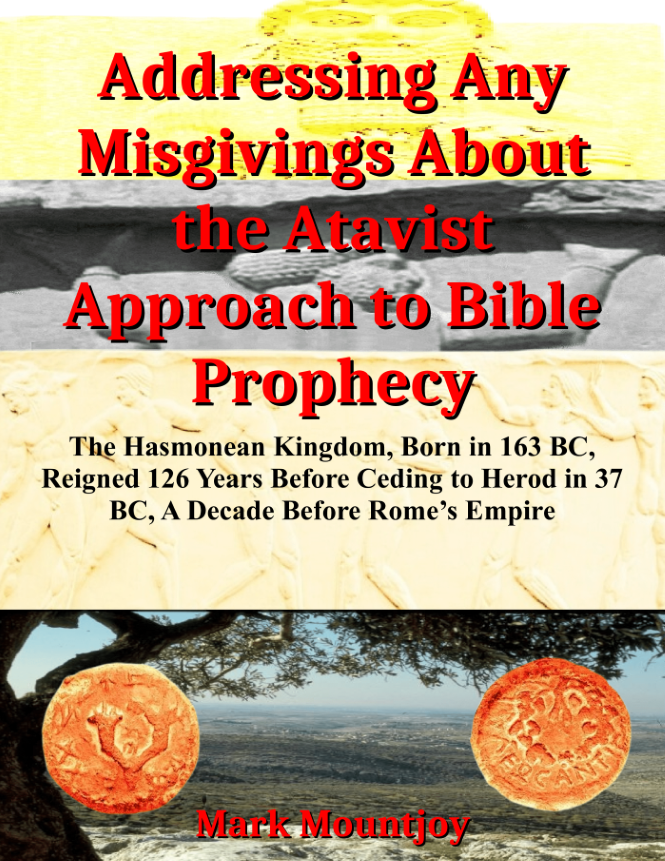Third Edition
Seven Passages in the New Testament Disabuse
the Erroneous, Patristic Notion That Instrumental
Music is a ‘Sinful Infraction’ for Christians
by Mark Mountjoy
Introductory Remarks
One of the puzzling debates within Christianity revolves around whether instrumental music is acceptable to God based on the differences between the Old and New Testaments. Some argue that while it was permitted in the Old Testament, the New Testament mandates singing without instrumental accompaniment. This viewpoint has sparked strong opinions, with some being assertive and others feeling defenseless and confused. This essay will not focus on proving that A Cappella music is not mentioned in the New Testament, as it is found in Matthew 26:30 and Acts 16:25. However, certain Christian authorities, chiefly those belonging to the Restoration Movement, argue that Ephesians 5:19 and Colossians 3:16 prohibit instrumental music for Christians, considering it a violation of the New Testament and thus sinful.1
The Parable of the Prodigal Son
I think and trust that Christians will be willing to acknowledge that something Jesus said or did, whether directly or indirectly approved, will influence our thoughts and decisions, even if it means changing our minds after careful consideration. This is evident when we examine the famous Parable of the Prodigal Son. Let’s read it first and then discuss how it connects to the topic of instrumental music,
“And he said, A certain man had two sons: 12 And the younger of them said to his father, Father, give me the portion of goods that falleth to me. And he divided unto them his living. 13 And not many days after the younger son gathered all together, and took his journey into a far country, and there wasted his substance with riotous living.
14 And when he had spent all, there arose a mighty famine in that land; and he began to be in want. 15 And he went and joined himself to a citizen of that country; and he sent him into his fields to feed swine.
16 And he would fain have filled his belly with the husks that the swine did eat: and no man gave unto him. 17 And when he came to himself, he said, How many hired servants of my father’s have bread enough and to spare, and I perish with hunger!
18 I will arise and go to my father, and will say unto him, Father, I have sinned against heaven, and before thee, 19 And am no more worthy to be called thy son: make me as one of thy hired servants.
20 And he arose, and came to his father. But when he was yet a great way off, his father saw him, and had compassion, and ran, and fell on his neck, and kissed him.
21 And the son said unto him, Father, I have sinned against heaven, and in thy sight, and am no more worthy to be called thy son. 22 But the father said to his servants, Bring forth the best robe, and put it on him; and put a ring on his hand, and shoes on his feet:
23 And bring hither the fatted calf, and kill it; and let us eat, and be merry:
24 For this my son was dead, and is alive again; he was lost, and is found. And they began to be merry. 25 Now his elder son was in the field: and as he came and drew nigh to the house, he heard music and dancing.
26 And he called one of the servants, and asked what these things meant. 27 And he said unto him, Thy brother is come; and thy father hath killed the fatted calf, because he hath received him safe and sound.
28 And he was angry, and would not go in: therefore came his father out, and intreated him. 29 And he answering said to his father, Lo, these many years do I serve thee, neither transgressed I at any time thy commandment: and yet thou never gavest me a kid, that I might make merry with my friends:
30 But as soon as this thy son was come, which hath devoured thy living with harlots, thou hast killed for him the fatted calf.
31 And he said unto him, Son, thou art ever with me, and all that I have is thine. 32 It was meet that we should make merry, and be glad: for this thy brother was dead, and is alive again; and was lost, and is found” (Luke 15:11-32).
The good part of this story was when the father celebrated his son coming back, even though he had been lost and made mistakes. But what’s interesting is that Jesus mentioned that the jealous brother could hear music and dancing from far away. This is interesting because it wouldn’t make sense for Jesus to say that the rich father used instruments to celebrate if he didn't like them.
Daily in the Temple
Every day, Jesus’ followers started gathering in Jerusalem, starting on Sunday, May 24 A.D. 33, which was around 6 Sivan 3794 in the Jewish calendar. They continued meeting, worshipping, and telling others about Jesus Christ, his resurrection, and how he would soon return to judge everyone, until around November 15, A.D. 66. During this time, they met at the Second Temple, where instrumental music was part of the daily worship led by the Levitical priests. Now, if Christians really wanted to avoid instrumental music, why would they choose to meet daily at a place where it was used in worship?
Some might say they met there only until the Temple was destroyed, so it doesn’t count. But that’s debatable since they were in a time of change back then.
Points Three and Four
Ephesians 5:19 and Colossians 3:16 represent points three and four, respectively. These verses are often used to argue against instrumental music in Christian worship, but hold on, let’s not jump to conclusions just yet! Some people think there are different kinds of worship: authorized, vulgar, and forbidden. Authorized worship is obviously allowed and preferred, while vulgar worship might seem right but is actually wrong, and forbidden worship is clearly sinful, like idol worship.
Since God allowed and even commanded instrumental music in worship, it can't be considered forbidden. However, some anti-instrumentalists make a specific analogy. They say,
“God specified gopher wood. Had Noah substituted mahogany for gopher, or used mahogany in addition to gopher, he would not have obeyed God’s commandment.”
Restoration authorities want Christians to believe that Ephesians 5:19 and Colossians 3:16 only approve of A cappella singing, but these passages don’t actually say that!
The Apostle Paul uses three different Greek words in these passages: ‘ψαλμοῖς,’ ‘ὕμνοις,’ and ‘ᾠδαῖς πνευματικαῖς.’ Surely, these expressions don’t all mean the same thing! ‘ψαλμοῖς’ refers to King David’s inspired book, where he mentions praising God with eight kinds of instruments - Psalms 150:1-6.
CENI’s interpretation ignores the cultural context of first-century Judaism and Roman civilization. In those times, solitary singing in the Second Temple was unheard of, and later Christian attitudes about instrumental music didn’t apply.
Ephesians 5:19 and Colossians 3:16 aren’t just about singing; they show the various ways Christians can praise and glorify God.
The Last Straw
The Book of Revelation is a tough challenge for CENI authorities. Despite their strict rules about worship, they can’t ignore what Revelation says. Three times in the book, it’s clear that what they call sinful on earth is actually allowed in heaven. This shows how their interpretation is incorrect. They forbid what God actually allows.4
First, we read,
“And I beheld, and, lo, in the midst of the throne and of the four beasts, and in the midst of the elders, stood a Lamb as it had been slain, having seven horns and seven eyes, which are the seven Spirits of God sent forth into all the earth. 7 And he came and took the book out of the right hand of him that sat upon the throne. 8 And when he had taken the book, the four beasts and four and twenty elders fell down before the Lamb, having every one of them harps, and golden vials full of odors, which are the prayers of saints” (Revelation 5:6-8).
Second, we read,
“And I looked, and, lo, a Lamb stood on the mount Sion, and with him an hundred forty and four thousand, having his Father’s name written in their foreheads.
2 And I heard a voice from heaven, as the voice of many waters, and as the voice of a great thunder: and I heard the voice of harpers harping with their harps: 3 And they sung as it were a new song before the throne, and before the four beasts, and the elders: and no man could learn that song but the hundred and forty and four thousand, which were redeemed from the earth” (Revelation 14:1-3).
Third,
“And I saw another sign in heaven, great and marvelous, seven angels having the seven last plagues; for in them is filled up the wrath of God.
2 And I saw as it were a sea of glass mingled with fire: and them that had gotten the victory over the beast, and over his image, and over his mark, and over the number of his name, stand on the sea of glass, having the harps of God. 3 And they sing the song of Moses the servant of God, and the song of the Lamb, saying, Great and marvelous are thy works, Lord God Almighty; just and true are thy ways, thou King of saints.
4 Who shall not fear thee, O Lord, and glorify thy name? for thou only art holy: for all nations shall come and worship before thee; for thy judgments are made manifest” (Revelation 15:1-4).
In the Book of Revelation, three times we see that not just the four beasts, but also the twenty-four elders have harps to praise God. Even the one hundred and forty-four thousand Israelite Christians each have harps for praising God. And those Christians who bravely stood against the Zealots during the Jewish civil war were given harps after suffering martyrdom. Does this mean something that was wrong on earth is suddenly okay in heaven?
Concluding Thoughts
When we look at the Parable of the Prodigal Son, it challenges the idea that instrumental music is forbidden in the New Testament. Why would Jesus include an act of celebration involving instruments if they were considered sinful?
Similarly, if Christians were against instrumental music, why would they worship near the Second Temple where it was used regularly? While this point may not be our strongest argument, the fact that instrumental music is depicted in heaven in the Book of Revelation supports our case.
We’ve also examined Paul’s words about singing and found it illogical to insist that Christians must sing only, especially considering the variety of words Paul uses. The comparison to Noah’s ark actually undermines the argument against instrumental music.
Furthermore, the Book of Revelation shows that instrumental music is not avoided in heaven. The so-called “Regulative principle” fails to consider passages that contradict its assumptions. It’s concerning that some Christians use these interpretations to feel superior and even condemn others to hell.5 We urge those considering our beliefs to reflect on the divisive and unscriptural reasoning behind such attitudes. These teachings go against the spirit of the New Testament and foster pride, intolerance, and exclusion.
Endnotes
1 For more on CENI visit: https://chasingalion.com/a/1223-five-problems-with-ceni-sos
2 http://www.thebible.net/biblicaltheism/0402insturments.htm
3 The logic of Christian authorities in a milieu of the Church, which is obviously not quite like our own, should not overshadow the main point of this essay: Does God, in the New Testament, allow or forbid these implements to be used by Christians?
4 Jesus said, “Whatever you bind on earth shall be bound in heaven.” And we saw that instrumental music is not bound in heaven, therefore it is not bound on earth.
5 “We use those as proof texts that instrumental music is wrong...telling others they are going to hell if they do embrace instruments.” https://mattdabbs.com/2008/01/26/reflections-on-gulfcoast-getaway-instrumental-music/
Related


